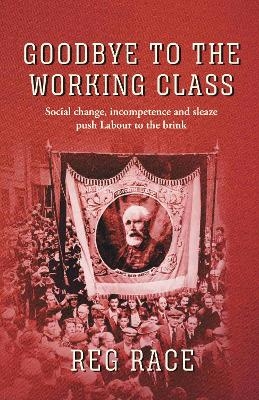
Goodbye to the Working Class
The Conrad Press (Verlag)
978-1-914913-02-0 (ISBN)
After 1979, Labour lost eight of the next eleven general elections. Working-class voters deserted, starting in 1970 when widespread abstention began, and the Conservatives won a majority of the working-class vote in 2019. Brexit was a consequence, and not the cause, of these massive changes.
The number of manual workers, Labour’s heartland vote, has collapsed and Britain is now a nation where the biggest occupational groups are shopworkers, education and NHS staff. Demographics have challenged Labour’s ability to win.
But that’s not all. Labour’s Parliamentary Party is now overwhelmingly middle class, and Labour has left the working class as the working class has left Labour. It is now a Party of Councillors and Special Advisers, with a membership dominated by the public sector middle class.
Labour has been the author of its own troubles too. It failed to adapt to change in the 1970s and 80s, attacked the low paid and appeased the powerful, and at a local level is disorganised and sometimes sleazy.
Its failures are structural. There is no strategic plan, sectarianism is rife, it has regular financial crises, fragile or unelectable leaders are appointed, and disastrous rule changes are made in an age when social media and the internet can disrupt politics on a daily basis. Power has been turned upside down as a consequence.
Political parties matter. Badly organised, ineffective leaderships create policy failures in government, and Labour has failed to ensure a supply of its own working-class or capable candidates too.
‘Goodbye to the Working Class’ explains why and how this happened. It is a human story of significant consequence for our politics.
Dr Reg Race joined Labour in 1963 whilst at school. His family were compositors, plumbers, cotton weavers and bleachers. He gained a Political Science BA and Ph.D from the University of Kent, contested a Canterbury City Council seat at the age of 22 and organised the first defeat for the Conservatives there since 1868. In 1972 he became research officer for NUPE and was Secretary of the National Steering Committee Against the Cuts, organising against the biggest ever cuts in public spending. In 1979 he was elected as MP for Wood Green, and was active on a woman’s right to choose, worked to get a national minimum wage agreed by Labour, campaigned to stop hospital closures and improve NHS pay, and to change the law on child abductions and sex shops as part of a campaign to change the position of women in society. His constituency was abolished by the Boundary Commission in 1983 and he went to work for the GLC as a financial planner and was in charge of the Parliamentary Campaign against abolition. He was later Chief Executive of a successful data analytics business.
ACKNOWLEDGEMENTS and credits5
PICTURE CREDITS15
FIGURE CREDITS16
PREFACE17
INTRODUCTION
The Long View24
A Homogeneous Country26
Decline of Class27
Voting Against your Class27
Middle Class Takeover28
Parliamentary Dominance29
Bureaucracy no Longer in Control30
Labour’s Approach to Capitalism30
Internal Revolts32
Credibility and Authority 33
CHAPTER 1
MANCHESTER IN THE HIGH NOON OF BUTSKELLISM36
My family and Other Workers37
The Quakers38
No Social Contact39
Not Noticing40
Newton Heath42
Across the Mersey43
Accelerating Decline44
The Fading of the Working Class 46
The Politics of Croslandism48
Profumo51
The Real Manchester52
Escaping from the Narrow World54
CHAPTER 2
GLAD CONFIDENT MORNING AND AFTER: THE EMERGENCE OF A NEW MIDDLE CLASS 58
Templeman60
First Contact60
Unpaid Labour 62
A Long History of Failure65
Decisive Events68
The Great Change70
Making it Stick72
The New Middle Class: First Stirrings73
Local Action Works Locally – but Only Locally 75
CHAPTER 3
THE 1970s BREAKDOWN OF KEYNESIANISM76
Jobs77
Industrial Unionism that Wasn’t78
The Deaths Column80
Beginning of the End82
Labour’s Response84
The Developing Crisis86
Based on Rubbish Data88
The Pivotal Point of Post-War Politics90
NUPE’s Engagement Plan91
The National Minimum Wage93
The Endless Problem of Wage Control94
The Statutory National Minimum Wage Emerges97
1974 and All That99
5% of Bugger All is Bugger All100
Going Outside the TUC Box101
Government Strategy Implodes104
Government Nonsense106
Callaghan and Healey Make the Jump108
Reaction and Counter Reaction110
Crunch Time: the Winter of 1978-79112
Testing the Temperature of the Water and Heating It Up
at the Same Time114
Failures of Leadership115
Biggest Wage Shock in Modern History116
The Powerful Do What They Can118
1.6 Million on Strike119
Going to the Top120
Fisher Fails to Organise, Callaghan Digs In121
Why This was Pivotal123
CHAPTER 4
WORKING IN PARLIAMENT AND THE DEVELOPMENT
OF THE REBEL ALLIANCE125
Getting Started126
The Patch128
The PLP132
Elitism and Control135
The Campaign for Labour Party Democracy136
Revolts and Structural Change137
CLPD, the Original Form138
Open Revolt for the First Time140
Special Conference: the Irony of Victory142
Slow Motion Train Wreck144
No One in Charge146
The Absent Issue147
Hard Graft: Multiple Roles149
Policy Development150
Low Pay151
Hospital Closures and Public Health152
The Black Report154
Abortion156
Women’s Rights and the Outrageous Attitude of Some Labour MPs160
Dealing with the Sex Industry – and the F-Word162
The Forgotten History of Women’s Rights Legislation164
Abducted Children and ‘Seema’s Laws’165
Low Pay and Public Service Issues Rumble on167
Stasis and Indolence169
The 1982 Wage Dispute171
The Economy and the Move to Deregulation, Unemployment and a Smaller State172
Social Security Front Line174
Deflation and Sod the Consequences: Learning to Win Elections with Mass Unemployment175
Nuclear Power and Climate Change in the 1980s177
Transport: the Attack on Subsidies181
School Meals and Milk: the Education Bill 1980182
The Falklands Crisis184
Eastern Europe: Opposing Stalinism and Repression186
Decay of the Tribune Group and Creation of the Socialist Campaign Group188
Always Getting it Wrong192
Leaving the Place 195
CHAPTER 5
THE FAILURE OF LOCAL LEADERSHIP199
Ken’s failing policies200
Abolition: Victory and Ultimate Defeat201
Defeat for Thatcher and Jenkin205
Money and Who Controlled What207
Rate Capping: the Year Zero Pol Pot strategy208
Victory for Common Sense210
Protecting London215
Stopping the Bonkers Nonsense217
Propaganda on the Rates: the Outreach Team218
Legislation, Legislation, Legislation 220
Failing to Deal with the Poll Tax222
Derbyshire: The Ultimate Horror Show224
Unreformed Bureaucracy and Libel Actions as Control226
Let’s Build a Holiday Resort – in the Soviet Union229
No Governance: Personal Rule232
The Very Worst of Local Authorities235
Lambeth: a Different Kind of Problem236
Deliberate Concealment237
Outright Corruption, Brown Paper Envelope Style240
Local Government in the 1980s241
The National Response: Tiny242
Reforming the Local State244
Malevolence in Action246
The Last Benn Initiative247
Twin Track Strategy, Failing248
CHAPTER 6
BLAIR/BROWN AND THE TRIUMPH OF CROSLANDISM251
Social Change in the 1990s: The Influence of Social Class
and other Variables on Social Attitudes251
The changing Size and Shape of the Classes254
A Nation of Shopkeepers at Last255
Political Generations256
Uncontrollable Change260
1997 and After261
Preparation Low262
Governing Blair Style265
Lapses of Judgement – and Very Good Luck265
Cassandras and Failure to Take Note270
Important History Lessons272
On the Ground in Derbyshire: the Divine Right to Rule273
Trying and Failing to Create an Infrastructure276
Huge Fight over Methane278
Constructive Threats280
£26m Victory282
The Labour Establishment283
A Limited Talent Pool285
Fissures and Factions287
Charges Withdrawn and then Reinvented288
The 2001 Election: the Benn Factor290
Selection and Payback294
Nothing to Go On297
CHAPTER 7
THE ACCIDENTAL LEADER EMERGES299
Anger and Vacuum300
The Unsupportable Friend 301
Not Learning304
The PLP Candidates Fail305
Chaos and Inertia309
The Disappearances314
Definitely Not Planned315
Analysing the Corbyn Problem316
The Strategic Opportunity.316
Strengths and Weaknesses of Team Corbyn 319
Risk Profile 321
Key Objectives 324
The Narrative 325
Coordination and Action327
Destabilising330
Saving Labour331
Decay and Poison 334
The 2016 Leadership Election336
Inversion of Power: Permanent or Not?338
Embourgeoisement – or Not?341
It’s Not the Ultra-Left Wot Won It342
A Very Large Sub Culture344
CHAPTER 8
THE DESTRUCTION OF WORKING CLASS REPRESENTATION AND THE ULTIMATE TRIUMPH OF PRESSURE GROUP POLITICS346
Uncertain Start and Searching for a Role347
The PLP in Charge – for a While348
Revolts and Resolution350
A Transformed Membership – the Working Class Largely Gone352
Sub Culture Development354
Is the Revolt Repeatable?357
Power decisions 1945: Ushering in the Dominance of the PLP358
Return to Normalcy?360
Class Structure and Party Identification361
Voters Switching Between the Conservative and Labour Parties 362
Small Parties Don’t Hold on to Voters 362
Left Wing Right Wing All in One Person363
The Disappearing Working Class – in Labour’s Leadership Cadre364
From a Party of Outsiders to a Party of Insiders365
Support and Training 368
The Effectiveness Deficit369
Experience of Running Absolutely Nothing370
Parliamentary Reform Fails 373
PLP: A Tool of Pressure Groups?376
The Minimalist Blair Revolution Inside the Party378
The Upending of Internal Power 378
The Problems of Sharing Power379
Working Class Candidates Gone380
The Most Middle Class Party in Britain380
The Working Class Say Goodbye382
No Voter Loyalty382
Right and Left – Can’t Tell the Difference383
The Elephant in the Room384
Defining and Defending the Boundaries385
Communities Largely Gone386
From the Top Judgements and Misjudgements 387
Leaden-Footed Responses389
CHAPTER 9
THE FAILURE OF PARTIES AS INSTITUTIONS392
From Social Class to the Internet395
Parties and Government396
The Cult of Amateurism399
Better Political Parties Mean Better Government400
Poor Ministers Cause Problems402
Labour has a Problem with its Culture406
Labour In 2050410
APPENDIX A
A NOTE ON STATISTICS413
APPENDIX B
A NOTE ON THE SELECTION OF CANDIDATES417
INDEX423
| Erscheinungsdatum | 24.09.2021 |
|---|---|
| Zusatzinfo | 40, including colour figures, colour photos and black and white photos |
| Verlagsort | Canterbury |
| Sprache | englisch |
| Maße | 159 x 245 mm |
| Themenwelt | Sozialwissenschaften ► Politik / Verwaltung |
| Sozialwissenschaften ► Soziologie ► Makrosoziologie | |
| ISBN-10 | 1-914913-02-7 / 1914913027 |
| ISBN-13 | 978-1-914913-02-0 / 9781914913020 |
| Zustand | Neuware |
| Haben Sie eine Frage zum Produkt? |
aus dem Bereich


